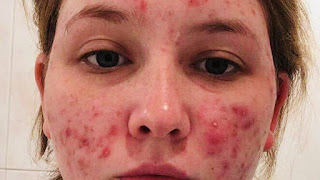1. "Understanding Diarrhea: Causes, Symptoms, and Natural Remedies"
Key Facts
✐ Diarrhea disease is the major cause of death in children under 5 years of age, with approximately 525,000 dying from it every year
✐ It can be prevented through access to safe drinking water, adequate sanitation, and hygiene.
✐Globally, there are almost 1.7 billion cases of childhood diarrhea disease annually, and it's also the leading cause of malnutrition in children under five.
Diarrhea is a common condition that affects people of all ages. It is characterized by the frequent passage of loose or watery stools. While diarrhea is usually not a serious condition, it can cause discomfort and inconvenience. Here, we will discuss the meaning, symptoms, causes, and natural remedies to treat diarrhea.
MEANING OF DIARRHEA
Diarrhea is a medical condition in which the digestive system becomes less efficient, leading to watery or loose stools. It occurs when the body is unable to absorb enough water from the food and fluids that are ingested. Diarrhea can be acute or chronic. Acute diarrhea lasts for a few days and is usually caused by infections, while chronic diarrhea lasts for weeks or longer and may be due to an underlying medical condition.
SYMPTOMS OF DIARRHEA
The symptoms of diarrhea may vary depending on the cause and severity of the condition. Some of the common symptoms of diarrhea include:
✐ Frequent passage of loose or watery stools
✐ Abdominal pain and cramping
✐ Bloating
✐ Blood or mucus in the stool, fever, nausea, and vomiting.
CAUSES OF DIARRHEA
There are many causes of diarrhea, while diarrhea can be caused by a variety of factors, it is important to understand the underlying causes to properly treat and manage the condition.
✐ Infections: One of the most common causes of diarrhea is an infection, which can be bacterial, viral, or parasitic. Infections can be contracted through contaminated food or water, as well as through close contact with someone who is infected. The most common causes of infectious diarrhea include norovirus, rotavirus, Salmonella, and E. coli. Most people suffered from diarrhea through contaminated water and food and it's the most common cause of diarrhea.
✐ Food Intolerances: Food intolerances can also cause diarrhea, particularly in people who have underlying conditions such as lactose intolerance or celiac disease. Lactose intolerance is a condition in which the body is unable to digest lactose, a sugar found in milk and other dairy products. Celiac disease is an autoimmune disorder that affects the small intestine, causing an immune response when gluten is ingested.
✐ Medications: Certain medications can also cause diarrhea as a side effect. Antibiotics, for example, can disrupt the natural balance of bacteria in the gut, leading to diarrhea. Other medications that can cause diarrhea include laxatives, antacids, and some chemotherapy drugs.
✐ Underlying Medical conditions: Chronic diarrhea can also be a symptom of underlying medical conditions such as inflammatory bowel disease (IBD), irritable bowel syndrome (IBS), and Crohn's disease. IBD is a group of conditions that cause inflammation in the digestive tract, while IBS is a chronic condition that affects the large intestine and can cause symptoms such as abdominal pain, bloating, and diarrhea. Crohn's disease is a chronic inflammatory condition that can affect any part of the digestive tract, from the mouth to the anus.
✐ Stress: Stress can also contribute to diarrhea. When the body is under stress, the digestive system can become more sensitive and reactive, leading to symptoms like diarrhea. Stress can also weaken the immune system, making the body more susceptible to infections that can cause diarrhea.
✐ Other Factors: Other factors that can contribute to diarrhea include changes in diet, particularly when a person consumes more fiber than usual, and travel to regions where food and water may be contaminated. Additionally, certain medical procedures such as radiation therapy and colonoscopies can also cause diarrhea as a side effect.
NATURAL REMEDIES DIR THE TREATMENT OF DIARRHEA
Diarrhea is a common condition that can be uncomfortable and inconvenient, but fortunately, many natural remedies can help alleviate symptoms and promote healing. While some cases of diarrhea may require medical intervention, mild cases can often be effectively treated at home with natural remedies. Here are some of the most effective natural remedies for diarrhea:
✐ Stay Hydrated: One of the most important things you can do when experiencing diarrhea is to stay hydrated. Diarrhea can cause dehydration, so it is important to drink plenty of fluids to replace those lost through diarrhea. Water, clear broth, and electrolyte drinks such as sports drinks can be helpful.
✐ Coconut Water: Coconut water is a natural source of electrolytes and can help replace those lost through diarrhea. It is also rich in potassium, which can help restore the balance of electrolytes in the body.
✐ Eat a Bland Diet: When experiencing diarrhea, it is important to eat a bland diet that is easy on the digestive system. This can include foods such as rice, bananas, plain toast, and applesauce. Avoiding spicy or fatty foods, dairy products, and caffeine can also be helpful.
✐ Chamomile Tea: Chamomile tea has anti-inflammatory properties that can help reduce inflammation in the digestive tract. It can also help soothe the digestive system and reduce symptoms such as diarrhea and abdominal pain.
Conclusion
In conclusion, natural remedies can be an effective way to alleviate symptoms of diarrhea and promote healing. While some cases of diarrhea may require medical intervention, mild cases can often be effectively treated at home with natural remedies. It is important to stay hydrated, eat a bland diet, and consider using probiotics, herbal teas, apple cider vinegar, and coconut water to alleviate symptoms and promote healing.







Comments
Post a Comment